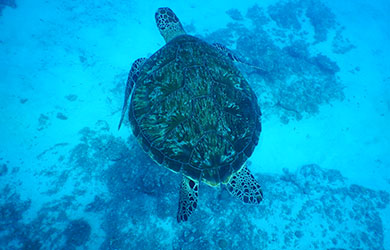
Sea turtles
Un autre regard sur l’océan, à hauteur de carapace.

Humpback whales play a key role in preserving marine ecosystems and the biodiversity they harbour. From June to October, humpback whales migrate to the warm waters of the Indian Ocean to breed and give birth. This is a golden opportunity for the marine biologists at our Marine Discovery Centre to organise sustainable whale-watching trips and study the whales' behaviour! What if we told you that you can join them during your stay?
Humpback whales play a key role in preserving marine ecosystems and the biodiversity they harbour. From June to October, humpback whales migrate to the warm waters of the Indian Ocean to breed and give birth.
This is a golden opportunity for the marine biologists at our Marine Discovery Centre, to organise sustainable whale-watching trips and study the whales' behaviour!
Humpback whales can live a long time – 50 to 70 years – but they face many challenges, such as collisions with ships, entanglement in fishing gear and marine pollution.... Another problem is noise pollution, which interferes with their ability to communicate and move around. Not to mention climate change, which is putting increasing pressure on their habitat. At the Marine Discovery Centre, we are determined to understand them better so that we can protect them more effectively.
Our biologists use hydrophones and photo identification to study humpback whale populations around Mauritius. Why hydrophones? Because the acoustic study of the males' songs allows us to determine whether two groups have been in contact. Song is transmitted horizontally between populations, rather than by direct descent!
Photo identification allows us to catalogue individuals in breeding and calving areas.
A first for Mauritius!
In August 2024, we completed a mission to tag humpback whales as part of the QWIO project, helping scientists track their movements, social behaviour, and feeding habits. Marine, our biologist, joined a US tagging expert and the Director of GLOBICE for the mission.
We scrupulously observe good practice during our whale-watching outings, in accordance with Mauritian legislation. Out of respect for the cetaceans, swimming is strictly forbidden. The boat is kept at a reduced speed and the engine is switched off when whale watching.
